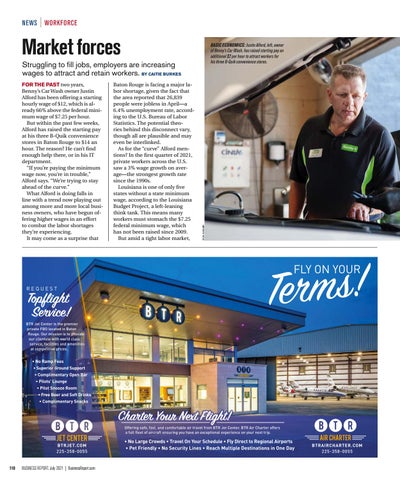NEWS
WORKFORCE
Market forces
BASIC ECONOMICS: Justin Alford, left, owner of Benny’s Car Wash, has raised starting pay an additional $2 per hour to attract workers for his three B-Quik convenience stores.
FOR THE PAST two years, Benny’s Car Wash owner Justin Alford has been offering a starting hourly wage of $12, which is already 66% above the federal minimum wage of $7.25 per hour. But within the past few weeks, Alford has raised the starting pay at his three B-Quik convenience stores in Baton Rouge to $14 an hour. The reason? He can’t find enough help there, or in his IT department. “If you’re paying the minimum wage now, you’re in trouble,” Alford says. “We’re trying to stay ahead of the curve.” What Alford is doing falls in line with a trend now playing out among more and more local business owners, who have begun offering higher wages in an effort to combat the labor shortages they’re experiencing. It may come as a surprise that
110
Baton Rouge is facing a major labor shortage, given the fact that the area reported that 26,839 people were jobless in April—a 6.4% unemployment rate, according to the U.S. Bureau of Labor Statistics. The potential theories behind this disconnect vary, though all are plausible and may even be interlinked. As for the “curve” Alford mentions? In the first quarter of 2021, private workers across the U.S. saw a 3% wage growth on average—the strongest growth rate since the 1990s. Louisiana is one of only five states without a state minimum wage, according to the Louisiana Budget Project, a left-leaning think tank. This means many workers must stomach the $7.25 federal minimum wage, which has not been raised since 2009. But amid a tight labor market,
DON KADAIR
Struggling to fill jobs, employers are increasing wages to attract and retain workers. BY CAITIE BURKES
BUSINESS REPORT, July 2021 | BusinessReport.com
110-113 News-Wages.indd 110
7/1/21 12:46 PM




















